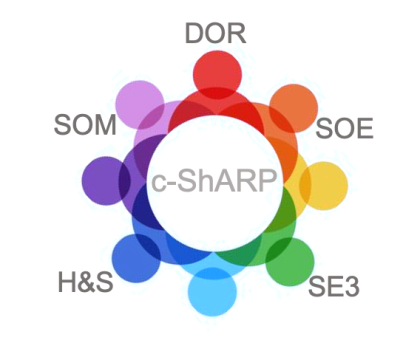c-ShARP Experiential Learning
Overview
c-ShARP welcomes collaborative proposals for educational efforts that leverage Stanford’s Shared Research Facilities to enrich scientific learning journeys with hands-on experiences, thereby facilitating research progress and promoting real-world skills to prepare scientists for successful careers at Stanford and beyond. These proposed educational efforts may include shared facilities access in support of registered coursework, teaching workshops using hands-on research techniques, preparation of high-quality on-line learning materials which support in-person experiences, and other similar efforts which benefit from core facility participation in disseminating educational curricula.
Each educational effort should provide its own proposal in response to this RFP, e.g., a course involving one or many shared facilities, a workshop spanning one or several days; closely related activities, e.g., a series of quarterly workshops, should be grouped into a single proposal. c-ShARP funding is intended to enable shared facilities to do more and support education in new, more involved ways. It should not be used to replace existing funding from other sources for existing activities pre-dating c-ShARP. Requests to support subsequent iterations of a c-ShARP-developed course are allowable. The total budget of any submitted proposal should not exceed $50K, though we will consider a higher request for exceptional cases.
This call is for FY23 funding; the next proposal cycle for FY24 funding will take place mid-FY23 in order to accommodate Fall 2024 learning experiences. If there is an urgent need to support a Fall 2023 course, please contact the Education Working Group asap via email at csharp_education-wg@stanford.edu.
The c-ShARP Shared Facilities and others span SOM, SOE, H&S, and SE3, and are an essential community for researchers; they include nanofabrication and characterization (SNF, SNSF), mass spectrometry (SUMS), NMR, imaging (BioX, c-EMc, CNI, CSIF, Lucas Center, Wu Tsai Neuro), life sciences/medicine (ChEM-H, FACS, SGSC, TASC, BSL-3) and sustainability (SE3 facilities), among others on campus, as well as shared Stanford facilities at SLAC. Proposals can be submitted by faculty, instructors, or shared facility staff, in collaboration as appropriate.
Evaluation Criteria
Proposals are evaluated according to the following criteria:
-
Justification of need: Does the experience fill an unmet need? How is it different from what’s currently available? What improvements will it bring to existing educational offerings? Is the format appropriate to the audience and goals? What is the level of demand for this type of learning opportunity? Is it part of a broader effort, e.g. Department, Program, Shared Facility strategic plan?
-
Impact: Who are the learners who will benefit from this experience? How will the experience be publicized to potential learners, particularly to relevant underserved populations? How does it improve accessibility to hands-on learning experiences? How does the experience benefit those involved? What will they be able to do as a result? What are the benefits to shared facilities, e.g. staff instructors, user group diversity, community building?
-
Finances: If previously supported by c-ShARP funding, how does the proposed continuation or enhancement experience extend c-ShARP’s investment? Are there opportunities for cost sharing? What is the potential for future iterations of experiences to be funded via teaching budgets, departmental funds, sponsorships, etc.? Is there a path to long-term sustainability beyond c-ShARP funding?
Reporting & Participation Requirements
The PIs of the funded proposals will be required to deliver a brief report on use, budget, and outcomes, and to assist in collecting feedback from participants in the learning experience. They will participate in a periodic Instructors’ Forum and may also be called upon to be reviewers for future rounds of c-ShARP Education funding.
All Stanford faculty and Shared Resources staff are eligible to apply.
A proposal should encompass a complete experiential educational opportunity, whether it be a course supported by one or several different Shared Resources, a quarterly workshop series, or a single standalone event.
The application should be concise, approximately 2 pages.
Funding can be applied to Shared Facilities' cost of staff time, instrument time, consumables, and other miscellaneous costs. Durable teaching equipment up to a total of $5K will be considered within the total budget, with appropriate justification.
